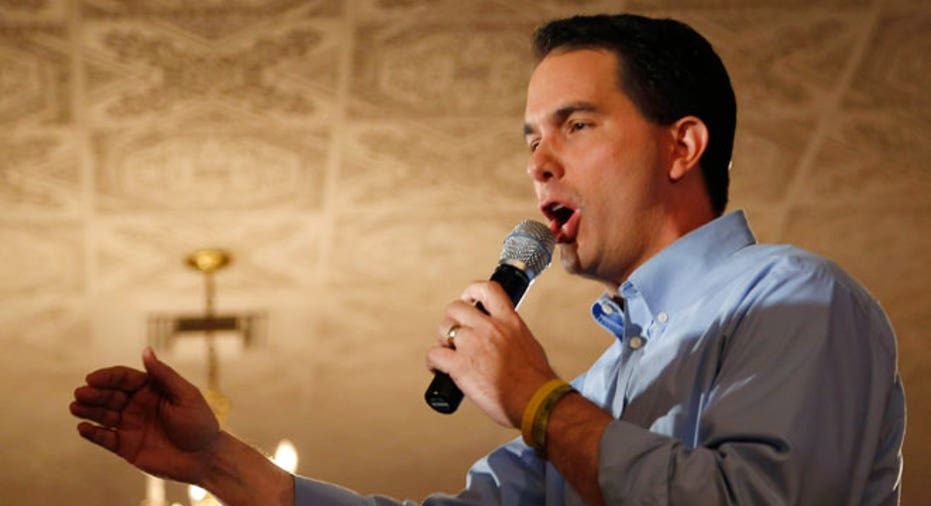Walker Wins in Wisconsin; Now What?

The governor’s election in Wisconsin yesterday had its roots in a battle over collective bargaining rights for public employees.
But the election garnered national attention because it spoke directly to a much larger issue, one that will undoubtedly play a key role in the November election: financially strapped Americans are tired of paying higher taxes to cover the costs of increasingly bloated and ineffective state and local governments.
Americans have always been conflicted. They rail that their taxes are too high but they demand the broadest possible and highest-quality services.
Politicians have long exploited this conflict, making sweeping promises to provide all things to all people, and then gaming the system to postpone payment of the inevitable bill. But now those payments are coming due.
“Scott Walker is an oddball. He’s willing to fight a political battle.”
The election in Wisconsin was viewed as a bellwether for the broader elections in November because Gov. Scott Walker, a first-term Republican, has said this destructive cycle has to stop.
To that end, Walker last year threw a monkey wrench into a well-oiled political machine. By reining in the collective bargaining powers of many of Wisconsin’s public employees, Walker effectively disrupted a time-honored tradition in which politicians and public employees got what they wanted at the expense of taxpayers.
“Scott Walker is an oddball. He’s willing to fight a political battle,” said John McAdams, an associate professor of political science at Marquette University in Milwaukee.
Collective bargaining may have sparked the battle that led to the recall election pitting Walker against Democratic challenger Milwaukee Mayor Tom Barrett. But Walker’s battle with Wisconsin’s public employee unions is just a skirmish in a much larger war, one that could potentially mean the difference between bankruptcy and solvency for countless municipal and state governments across the U.S.
In fiscally strapped states such as California, Illinois and New Jersey, to name just a few, politicians have for years approved generous contracts for their public employees in exchange for support at the polls and campaign contributions from the unions that represent those employees. It’s been a mutually-beneficial symbiotic relationship.
The political gamesmanship has been especially savvy in the area of pensions. Over the years, politicians have granted public employees lavish pension benefits -- early retirements, full healthcare coverage, no employee contributions, etc. -- and kept these arrangements quiet because the payments didn’t begin for years.
In many cases, the politicians failed to even create a plan to pay for those pensions. They simply used smoke and mirrors to create an illusion that the payments would be covered when they came due.
Two factors essentially forced Walker to take a stand. First, millions of baby boomers ranging in age from 50 to 70 are approaching retirement and those generous pension plans approved over the years are now facing soaring deficits. Second, the financial crisis of 2008 and deep recession that followed has left countless Americans on fragile financial footing, scared for their jobs and their homes.
Tough Environment for Politicians to Raise Taxes
These cross currents have made it a lot tougher for politicians to raise taxes in order to pay for public employee pension benefits that in most cases far exceed the retirement plans of private sector workers.
Walker, using the issue of collective bargaining, planted himself firmly in the middle of that battle. His victory will resonate far beyond Wisconsin’s borders.
“It says a governor under fiscal stress can take on the unions and win,” said McAdams.
Walker argued last year that Wisconsin’s $3.6 billion budget deficit required significant reforms to the state’s finances. In a series of highly contentious votes last winter that drew international attention and led to raucous union-led protests in Wisconsin’s state capital building in Madison, the state’s legislature approved Walker’s reforms that limited collective bargaining and initiated across-the-board spending cuts.
Collective bargaining became a proxy for the larger fiscal issues because it provides public employee unions with what critics believe is unfair leverage not accessible to private sector employees who also negotiate their contracts under collective bargaining agreements.
Private companies can always pack up and move somewhere else, or go out of business altogether, leaving employees out of work. That’s a strong negotiating chip. Governments don’t have that leverage. Consequently, public employee unions start negotiations from a position of strength that only gets stronger when politicians join forces with the unions in mutually-beneficial pacts.
“In the private sector, the market limits what unions can demand and get. In the public sector, politicians have much less of an incentive to drive a hard bargain,” McAdams explained.
In Wisconsin, Walker’s spending reforms seem to be working. The $3.6 billion that served as a catalyst for Walker’s battle with the public employee unions has now apparently been turned into a surplus, according to recent projections from the Wisconsin Department of Revenue.
“The bottom line is that he’s put Wisconsin on a sound fiscal basis,” said McAdams. “To get that done there was there was a need for some givebacks on the part of the unions.”
Voters in Wisconsin voted as much on the larger issue of fiscal constraint on the part of government as on the smaller issue of collective bargaining rights. And the rest of the country will be watching.



















